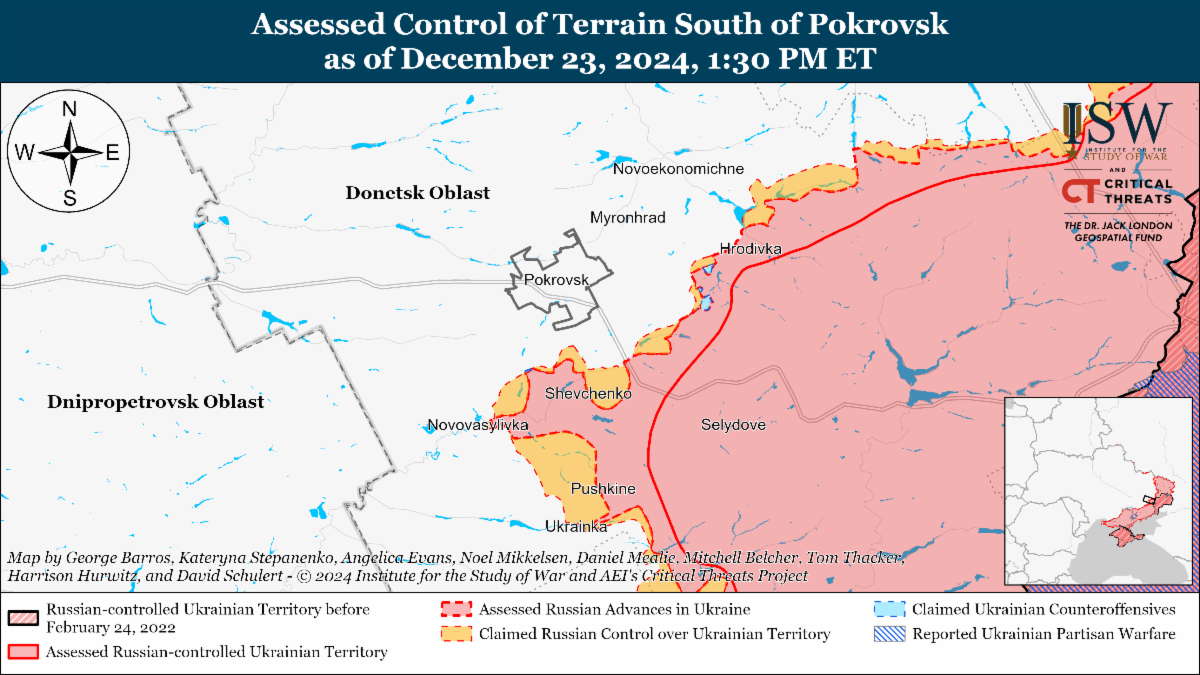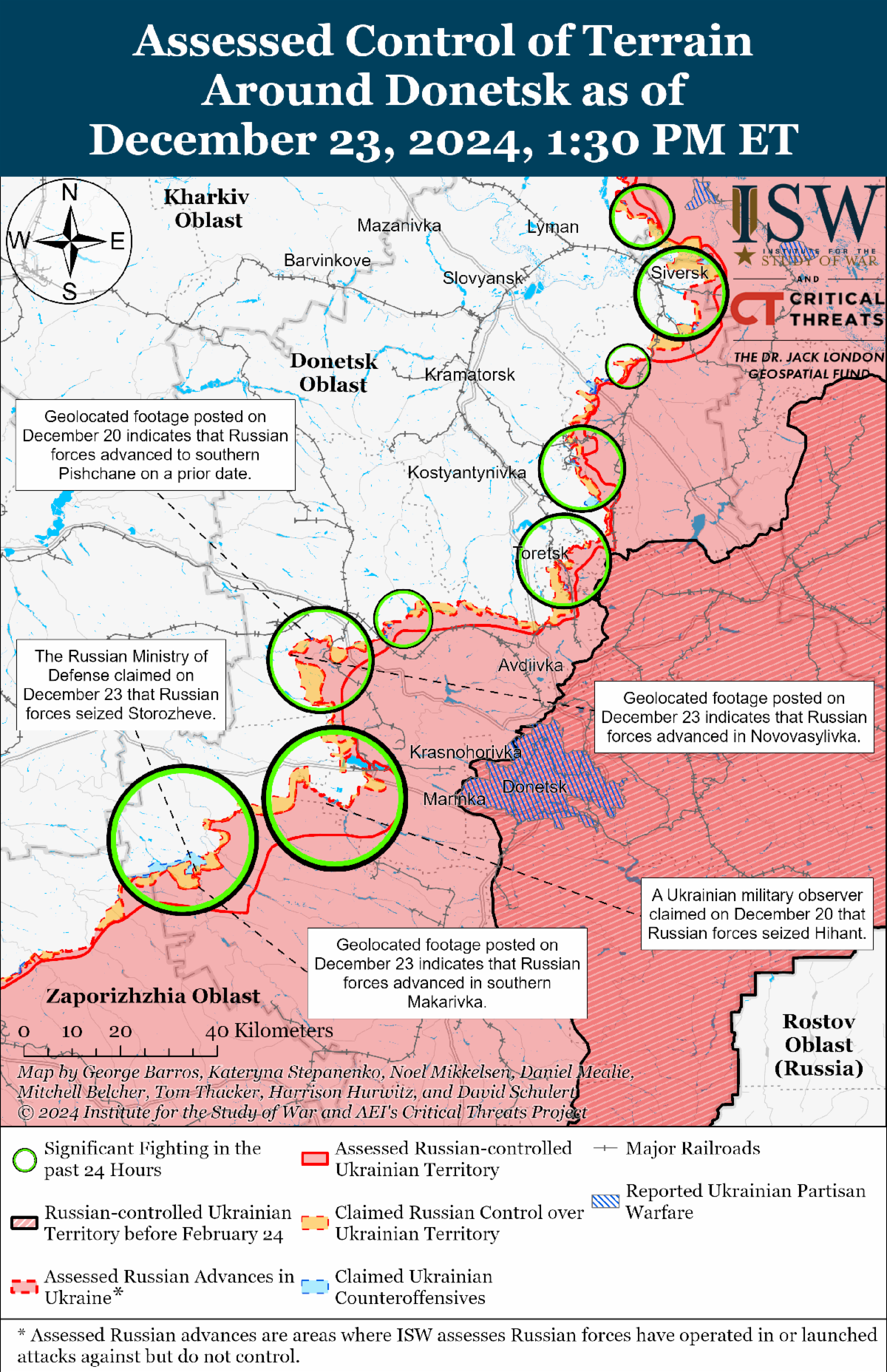Russian Offensive Campaign Assessment |
|
Angelica Evans, Nicole Wolkov, Kateryna Stepanenko, Nate Trotter, Kelly Campa, and Fredrick W. Kagan December 23, 2024, 9:15pm ET |
|
Click here to view our Russia-Ukraine interactive maps.
Click here to view our special reports since 2024. |
|
Russian forces are gradually advancing south and southwest of Pokrovsk, but it remains unclear if Russian forces will be able to exploit these gains to envelop the town or if they intend to advance to the administrative boundary of Donetsk Oblast. Geolocated footage published on December 23 indicates that Russian forces recently advanced south of and within eastern Novovasylivka (southwest of Pokrovsk), and a Russian milblogger claimed that Russian forces advanced north of Novovasylivka towards Solone and Vovkove and are attacking towards Kotlyne. A Kremlin-affiliated Russian milblogger claimed that Russian forces are focusing their attacks on Novotroitske (east of Novovasylivka) and Dachenske (south of Pokrovsk) and forced Ukrainian forces to withdraw to the Lysivka-Pishchane line (southeast to south of Pokrovsk). The milblogger claimed that Russian forces are also advancing from Pustynka and Pushkine (both further south of Pokrovsk) towards Ukrainka (southwest of Pushkine). ISW previously assessed that the Russian military command intends to envelop Pokrovsk via a turning maneuver from the south, but Russian advances southwest of Pokrovsk could be aimed at widening the Russian salient in preparation for the envelopment of Pokrovsk from the south or alternatively for advancing westward to the Donetsk-Dnipropetrovsk Oblast administrative border as part of the Kremlin's political and informational objective of seizing the entirety of Donetsk Oblast. |
|
It remains unclear which effort the Russian military command will prioritize, as Russian President Vladimir Putin may have tasked the Russian military with securing territorial gains rather than seizing significant settlements. Putin stated during his annual Direct Line televised press conference on December 19 that Russian forces are advancing not in "100, 200, 300 meters" but in square kilometers throughout the frontline, and Putin appears to be increasingly characterizing Russian advances in terms of square kilometers instead of highlighting the seizure of particular settlements as he had previously done. Putin may have instructed the Russian military command to delay the seizure of Pokrovsk in favor of making further gains through open fields and small settlements, particularly as Russian forces advance closer to the Donetsk-Dnipropetrovsk Oblast administrative boundary. ISW has observed geolocated evidence sufficient to assess that Russian forces are within 10 kilometers of the Donetsk-Dnipropetrovsk Oblast administrative boundary, and Putin may be pressuring the Russian military command to advance to the boundary rather than to envelop Pokrovsk at this time. Seizing the remainder of Donetsk Oblast is one of Putin's long-standing objectives in Ukraine, and Putin would likely highlight Russian advances up to the boundary to make outsized claims about Russian successes in Ukraine for both foreign and domestic audiences. An organized offensive operation against well-defended towns could slow the rate of Russian advance during a critical moment in the Kremlin's efforts to project the inevitability of Russian military victory on the global stage.
Key Takeaways:
- Russian forces are gradually advancing south and southwest of Pokrovsk, but it remains unclear if Russian forces will be able to exploit these gains to envelop the town or if they intend to advance to the administrative boundary of Donetsk Oblast.
- It remains unclear which effort the Russian military command will prioritize, as Russian President Vladimir Putin may have tasked the Russian military with securing territorial gains rather than seizing significant settlements.
- The Russian military command appears to have split responsibility for the Pokrovsk direction between the Central Military District's 2nd and 41st combined arms armies (CAAs), and ISW has yet to observe significant Russian activity in the 41st CAA's area of responsibility (AoR).
- Decreased combat effectiveness among Russian forces may be slowing the rate of Russian advance in the Pokrovsk direction.
- Increased Russian armored vehicle losses over the last year, particularly among Russian units and formations that have been engaged in frontline combat for most of 2024, may be impacting Russia's rate of advance in certain sectors of the frontline.
- North Korea is reportedly planning to deploy more troops and weapons to Russia amid reports that over 3,000 North Korean troops have been killed and wounded in Kursk Oblast.
- Russian President Vladimir Putin used his meeting with Slovak Prime Minister Robert Fico to advance Russia's campaign to undermine Western unity in supporting Ukraine.
- The Kremlin may be setting information conditions for a false flag in the pro-Russian breakaway region of Transnistria likely in a continued attempt to destabilize Moldova and hinder its integration into European Union (EU).
- Russian forces have reportedly withdrawn completely from most of their positions in Syria, including their base at Qamishli in northern Syria. (NOTE: A version of this text also appears in ISW-CTP's December 23 Iran Update.)
- Russian forces recently advanced near Kupyansk, Toretsk, Vuhledar, Velyka Novosilka, and in Kursk Oblast.
- The Kremlin's "Time of Heroes" program, which aims to appoint Russian veterans into government positions, is already causing conflict between veterans and corrupt regional officials.
|
|
Donate online or by sending a check to the Institute for the Study of War at 1400 16th Street NW, Suite #515, Washington, DC, 20036. Please consider including the Institute for the Study of War in your estate plans.
ISW is a tax-exempt organization under section 501(c)(3) of the Internal Revenue Code. Donations are tax-deductible to the extent permitted by law. |
The Institute for the Study of War (ISW) is a non-partisan, non-profit, public policy research organization. ISW advances an informed understanding of military affairs through reliable research, trusted analysis, and innovative education. We are committed to improving the nation's ability to execute military operations and respond to emerging threats in order to achieve US strategic objectives. |
|
|
|
|






 [ISW] 러시아 공세 캠페인 평가, 2024년 12월 27일
[ISW] 러시아 공세 캠페인 평가, 2024년 12월 27일
 [ISW] 러시아 공세 캠페인 평가, 2024년 12월 22일
[ISW] 러시아 공세 캠페인 평가, 2024년 12월 22일